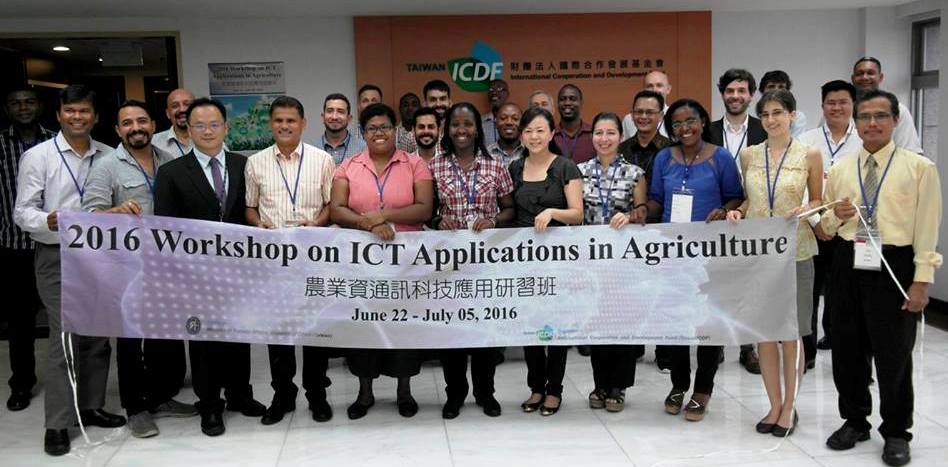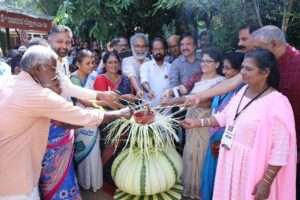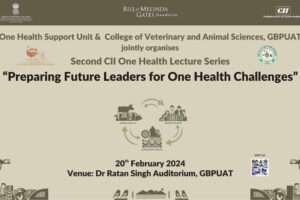 Dr. B. P. Singh, Principal Scientist, Division of Extension Education, ICAR-Indian Veterinary Research Institute, Izatnagar, recently spent 14 days in Taiwan to attend a Workshop on ICT Applications in Agriculture. In this notes, he narrates his experiences.
Dr. B. P. Singh, Principal Scientist, Division of Extension Education, ICAR-Indian Veterinary Research Institute, Izatnagar, recently spent 14 days in Taiwan to attend a Workshop on ICT Applications in Agriculture. In this notes, he narrates his experiences.
CONTEXT
Information and Communication Technology (ICT) tools, used globally, enhance the quality and quantity of agricultural production. ICTs enable traditional agriculture to transition into an era of precision agriculture. To this end, International Cooperation and Development Fund (ICDF), Taiwan, organized a workshop on “ICT Application in Agriculture” at Taipei held from 22 June 2016 to 5 July 2016. The aim of the workshop was to share Taiwan’s development experience in e-agriculture and assist partner countries in developing agriculture through ICT applications. This workshop was attended by 28 Government officials (representing 22 countries) who are responsible for developing strategies of ICT application in agricultural production and marketing. The attendees included ICT managers in the agricultural business or partners working with Taiwan Technical Missions or related projects. Participants from India, Libya and Mauritius were sponsored by the African-Asian Rural Development Organization (AARDO).
Objectives of the Workshop:
- Highlight the importance and value of ICT applications in the development of agriculture
- Share Taiwan’s experience in using ICT applications to create a favourable agriculturalproduction environment; intellectualize agricultural information and improve agricultural production and marketing.
PROGRAMME
DAY 1:

Mr. Jia-Jeng Ju, the Programme Officer of International Education and Training Department, ICDF, Taiwan welcomed the participants and briefed about the workshop schedule. He also talked about the educational opportunities and the fellowships available to pursue education and research in Taiwan. Ms. Allison Hsu, Division Chief of International Education and Training Department, ICDF, Taiwan, also addressed the participants.
Participants with Ms. Allison Hsu, Division Chief of International Education and Training Department, ICDF, Taiwan, in Food Tech Expo
Ms. Laura, Meng-Yen Lou, Lecturer of Department of Spanish, Tamkang University, Taiwan, delivered a lecture on Introduction to Taiwan. She shared information on different aspects of Taiwan, viz., its geography, history, culture, economy, transport system, trade, tourism opportunities, agricultural scenario, political system, major cities and market, health services and infrastructure etc.
DAY 2:
 The participants presented a report on the ICT Applications in agriculture along with the challenges in their respective countries. In this session, I presented the following ICT initiatives in India:
The participants presented a report on the ICT Applications in agriculture along with the challenges in their respective countries. In this session, I presented the following ICT initiatives in India:
- Kisan Call Centre
- e-NAM,
- Mobile Apps – Kisan Suvidha, agrimarket, Pashu Poshan, InDG
- MSSRF initiative
- NDDB’s initiatives like Akashganga and DISK
- ICT initiatives from ICAR and SAUs for the development of expert system, livestock and crop disease information system etc.
Orientation with the Taiwan’s culture during workshop
DAY 3:
The first session began with a lecture on “Overview of ICT Development in Agriculture in Taiwan” by Ms. Shu-Huei Chen, Secretary-General of Taiwan Agricultural Information Technology. It was a comprehensive lecture covering a wide range of information about ICT applications (WSN-based oriental fruit fly ecological monitoring system in Guava, LED trap, RFID in crop and food traceability, cloud computing network etc.) covering the following areas:
- agriculture at research and extension station
- development department viz. animal husbandry, forestry including agriculture, farmers’ field, food safety sector,
- veterinary drug management and
- the association of farmers and fishermen in updating their group farmers about new farming technologies.
In the second session, Dr. Li-yu Daisy Liu, Associate Professor of Department of Agronomy Biometric Division, National Taiwan University, delivered a lecture on “The prediction and information for crop production.” This lecture mentioned about the use of Oryza-a statistical model developed by the scientists of International Rice Research Institute (IRRI) for the prediction of rice production. Another statistical model “Decision Support System for Agro-technology Transfer (DSSAT)”was also discussed.
DAY 4-5:
The participants were introduced to the history and culture of Taiwan through a tour of the City.
DAY 6:
Dr. Joe-Air, Professor of Bio-Industrial Mechatronics Engineering, National Taiwan University, delivered a lecture on “The Agricultural ICT Applications to Pest Management”. In this meticulous lecture, the information was given about the New ICT tools viz., IoT (Internet of Thing), WSN InfoCom Platform for Pest Surveillance, Innovative Pest Sensor and automatic weather station. A demonstration on pest attack in crop and its information in wireless software was conducted.
This was followed by a field trip to “The First Group of Guava Production and Marketing Groups” in Yuanlin City, Changhua County, Taiwan.
A group of guava farmers here use the automatic weather station and the ICT tool “M2M-based Remote Pest Surveillance System” in their field. Demonstration of ICT based pest management in crop during the lecture
DAY 7:
Dr. Chung-The Sheng, Professor of Bio-Industrial Mechatronics Engineering, National Chung Hsing University, Taiwan, delivered a lecture on “RFID Technology Application in Traceable Agriculture Products (TAP)”. This lecture was very enlightening. He talked about the benefits of the RFID application for inventory and inspection of the recommended agricultural techniques applied by the farmers, Internet of Things was explained in Field trip to the vapor heat transaction plant using RFID detail.
A field trip to Yujing Vapor Heat Transaction Plant, Tainan, Agriculture Trading Co. Ltd. was conducted. This semi-government company is jointly managed by the government, association of farmers and technocrats. This company has been responding to the export demand from other countries (e.g., Japan and South Korea). The list of export products includes mango, guava, litchi and dragon fruit. The company works with farmers who can meet their demand for export quality fruit and vegetables, within the acceptable level of chemicals residues. The process from production, harvesting, processing and export is monitored by RFID technique. Various steps including harvesting/grading/barcoding/packing, storage etc., involved in consignment for export were demonstrated in this field trip.
DAY 8:
A lecture on “Installation and application for agricultural information dissemination system” was delivered by Mr. Wen-Chi Cheng, Assistant Researcher, Kaohsiung District Agricultural Research and Extension Station (DARES), Council of Agriculture, Executive Yuan. The structure of agricultural organization, infrastructure in agriculture education, research, extension and training were discussed in the lecture. Ways to disseminate agricultural information using the following ICT tools were also discussed:
- Agricultural knowledge expert
- encyclopaedia
- agricultural knowledge database
- online and offline education
- agricultural broadcasting services
- multimedia services
- social network formed for agricultural development.
Post-lunch, the participants went for a field trip to Kaohsiung District Agricultural Research and Extension Station (DARES). An educational film on agricultural technology development and an exhibition depicting technologies, research trials, research farm, training facilities for the farmers, rural youth and farm women were shown.
DAY 9:
Mr Ching-Yu Lin, Director of Ling Cheng Technology Co. Ltd delivered the lecture on Application of Enterprise Resource Planning (ERP) in Agriculture. This lecture dealt with the various computer software and ICT applications (viz. production operation management, production scheduling, cultivation information maintenance, fertilizer and agrochemical management, sample testing management, production traceability network, farm resource manage-ment etc.) developed by this private firm for the use of farmers. Participants at Ling Cheng technology building for workshop
After the lecture, a field trip to this company was organized. The participants discussed Kaohsiung with the ICT personnel and computer operators involved in developing various ICT applications for the farmers.
DAY 10
Ms. Meng-Min Venus Chen, Co-founder and Chief Operating Officer (COO) of Geo Things, delivered a lecture on the “Agricultural products Marketing Strategies of Smart Agriculture”. The ICT-based strategies/applications viz., Direct2Farm project implemented by CABI in India for providing high quality authentic and validated information to the farmers, Open Geo SMS for farmers, ICT in the marketing of farm produce and value addition in surplus fruit production etc, were discussed. The lecture was followed by a field trip to the 23rd Group of fruit production and Marketing in Nanxi District, Tainan City, wherein, the visit to the farm of fruit farmers’ family was also conducted. The fruit farmer was using the various software and ICT applications to manage fruit farms of Mango, Guava, Litchi and Dragon fruit.
DAY 11:
Participants visited the Taiwan Indigenous Culture Park and Liudui Hakka Culture park on 2nd July. The Taiwan Indigenous Peoples Cultural Park exhibits the lifestyle and cultural heritage of the aboriginal tribes in Taiwan. We were Field trip to the family of fruit farmers shown the Hakka culture, traditions, architecture and customs with the modern concepts as environmental protection in the park which has a multimedia exhibition hall, performance arts theatre and handicrafts. We were told that Liudui is inhabited mainly by people of Hakka ancestry. After this culture trip, the participants were taken back to Taipei by high-speed rail for completing the remaining part of the workshop.
Day 12
This day was kept free for the participants for visiting the Taipei city, the capital of Taiwan.
DAY 13:
A lecture on “Application of 3S (GPS/GIS/RS) Techniques of Detection Survey and Control in Agriculture” was delivered by Mr. HorngYuh Guo, Senior Soil Scientist and Director of Agricultural Chemistry, Taiwan Agricultural Research Institute (TARI). ICT applications in land administration and management, soil conservation, soil fertility management, soil
CEC map, in Taiwan was discussed in this Participants at Food Tech Expo Taipei presentation. The following were also presented in this lecture:
- A map of soil for the entire Taiwan designed/demarcated for the cultivation of forage crop, mango, Indian Jujube, grape ,
- UAV spray pesticides in the field,
- UAV application on crop surface model.
The post lunch session was earmarked for the preparation of group accomplishment report for presentation during the closing ceremony.
DAY 14:
Group Accomplishment Report Presentation and Closing Ceremony
The participants divided into four groups presented their accomplishment report before the dignitaries of the closing ceremony. The accomplishment report was prepared and presented based on the following questions:
- What did the participants gain from the workshop (including personal benefits)?
- How will the participants apply what they have learned from the workshop?
- Any further suggestion to improve the workshop?
Each group presented their accomplishment report for the time allotted (15 minutes each group) and the best accomplishment report was given a special reward. The workshop ended with the distribution of certificates and brief remarks by the dignitaries.
Group of participants presented best accomplishment report
WHAT I LEARNT
I specifically learnt about the following:
- the usage of RFID in crop and food traceability in the case of mango and beef production traceability system
- WSN application for the real- time monitoring system of the fruit fly
- Cloud computing network
- Wireless sensor network to take the stock of environmental situation viz., temp, light, sound, humidity etc.
- ICT tools used in land management
- Development of production plan
- Management of field work and harvesting.
- Familiarity with various software used by farmers for management of crops.
Apart from this, I also learnt about the various farmers’ associations (360) in Taiwan and the application of ICT tools by farmer and their associations in agriculture production management. It was an amazing experience for me to get acquainted with ICT initiatives in 22 countries and listening to the experiences of each participant. I also learnt that the focus of a training programme should be more on technical aspects than wasting time in elaborate opening and closing ceremonies and long speeches.
MY IMPRESSIONS ABOUT THE WORKSHOP
The workshop was meticulously designed and implemented. All lectures focused on the latest developments in application of ICTs in agriculture. Every participant was taken care of by the Taiwan ICDF. I found following aspects appreciable:
- The participants were informed well in advance about the venue, contact person at Taiwan Airport, contact person at Hotel in Taiwan, contact person at Taiwan ICDF etc.
- The participants were also informed in advance to present an overview of ICT application in agriculture development and related policies in their respective countries.
- Four younger staff of ICDF were deputed to take care of the participants and they stayed in same hotel to provide round-the-clock support and guidance for participants.
- On arrival at Taiwan ICDF, the participants were given the compendium of all lectures, information about the field trip, programme, workshop venue, accommodation venue, visit spot etc.
- The workshop was conducted in three different cities of Taiwan which provided participants an opportunity to know more about Taiwan.
- The accommodation at all the three places was at very good hotels with wi-fi and having all other facilities.
- A variety of delicious food from various countries viz., Taiwanese, Chinese, Japanese, South Korean were served to each and every participant.
- The lectures were very informative, educational, practical oriented and given by well-known experts and scholars. After every lecture, a Question-Answer session of 10- minute session was essential.
- The lectures and field trip were conducted in a very systematic way. While the first session focused on a topic through lecture, the second session had a field trip related to the lecture in the first session.
- All the resources related to presentations, lecture notes and photos were provided in a USB derive to each participant before the closing ceremony.
- The photos of closing ceremony were sent via email immediately after the workshop.
Dr B P Singh is Principal Scientist, Division of Extension Education, ICAR-Indian Veterinary Research Institute, Izatnagar . (Email: bpsingh_ext@rediffmail.com.)





Happy to see it, well done!